人教版八年级上册英语Unit7知识点梳理及语法讲义(学生版)
- 格式:docx
- 大小:86.00 KB
- 文档页数:15
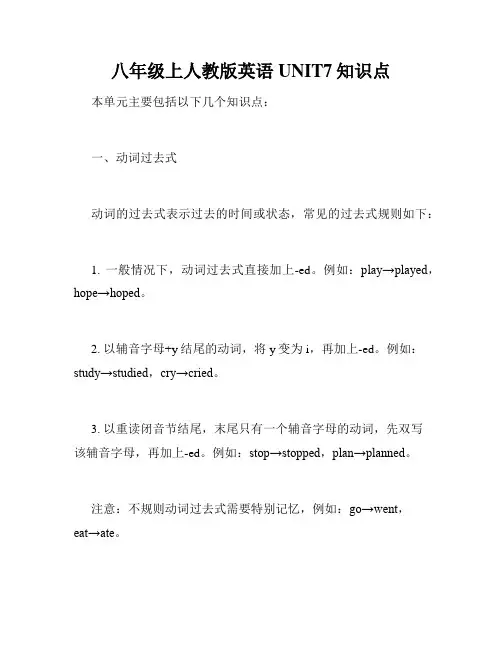
八年级上人教版英语UNIT7知识点本单元主要包括以下几个知识点:一、动词过去式动词的过去式表示过去的时间或状态,常见的过去式规则如下:1. 一般情况下,动词过去式直接加上-ed。
例如:play→played,hope→hoped。
2. 以辅音字母+y结尾的动词,将y变为i,再加上-ed。
例如:study→studied,cry→cried。
3. 以重读闭音节结尾,末尾只有一个辅音字母的动词,先双写该辅音字母,再加上-ed。
例如:stop→stopped,plan→planned。
注意:不规则动词过去式需要特别记忆,例如:go→went,eat→ate。
二、情态动词的用法情态动词表示说话人对某种情态的看法或态度,常见的情态动词有can、could、may、might、shall、should、will、would、must 等。
情态动词的用法如下:1. 表示能力、许可、请求等。
例如:can、could、may、might 等。
2. 表示义务、责任等。
例如:must、should等。
3. 表示预测或假设。
例如:will、would等。
4. 表示劝告、建议。
例如:should、ought to等。
5. 表示肯定、否定、疑问等。
例如:will、would、can、could、should、must等。
三、过去进行时过去进行时表示过去某一时刻正在进行的动作。
构成方式为was/were+动词的现在分词。
例如:I was listening to music at 8o'clock yesterday evening.四、短语动词短语动词指由一个动词和一个或多个副词、介词或形容词构成的习惯用语。
常见的短语动词有look after、break down、take off、put on等。
短语动词的意义与原来的动词意义不同,需要特别注意。
五、不定式不定式是由to+动词原形构成的,具有名词和动词的特点,可以作为动词、形容词和副词的宾语、主语、表语等。
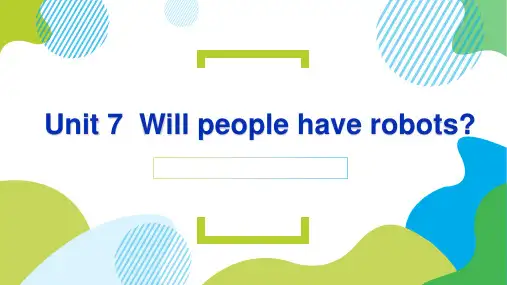
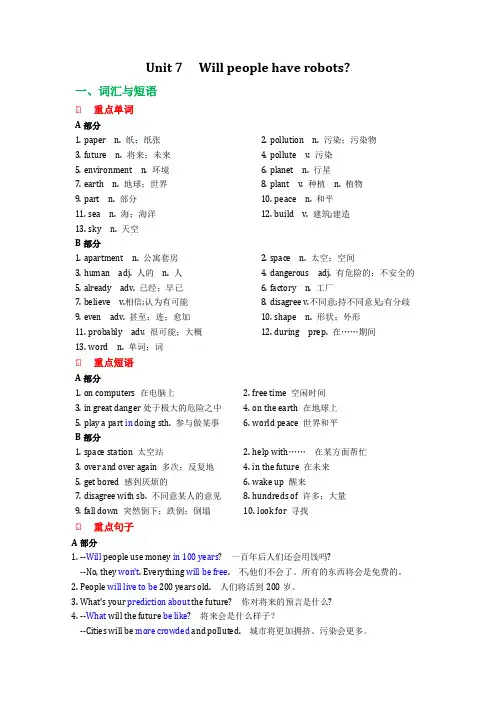
Unit 7 Will people have robots?一、词汇与短语● 重点单词A部分1.paper n. 纸;纸张2.pollution n. 污染;污染物3.future n. 将来;未来4.pollute v. 污染5.environment n. 环境6.planet n. 行星7.earth n. 地球;世界8.plant v. 种植n. 植物9.part n. 部分10.peace n. 和平11.sea n. 海;海洋12.build v. 建筑;建造13.sky n. 天空B部分1.apartment n. 公寓套房2.space n. 太空;空间3.human adj. 人的n. 人4.dangerous adj. 有危险的;不安全的5.already adv. 已经;早已6.factory n. 工厂7.believe v.相信;认为有可能8.disagree v.不同意;持不同意见;有分歧9.even adv. 甚至;连;愈加10.shape n. 形状;外形11.probably adv. 很可能;大概12.during prep. 在……期间13.word n. 单词;词● 重点短语A部分1.on computers 在电脑上2.free time 空闲时间3.in great danger处于极大的危险之中4.on the earth 在地球上5.play a part in doing sth. 参与做某事6.world peace 世界和平B部分1.space station 太空站2.help with……在某方面帮忙3.over and over again 多次;反复地4.in the future 在未来5.get bored 感到厌烦的6.wake up 醒来7.disagree with sb. 不同意某人的意见8.hundreds of 许多;大量9.fall down 突然倒下;跌倒;倒塌10.look for 寻找● 重点句子A部分1.--Will people use money in 100 years? 一百年后人们还会用饯吗?--No, they won't. Everything will be free. 不,他们不会了。
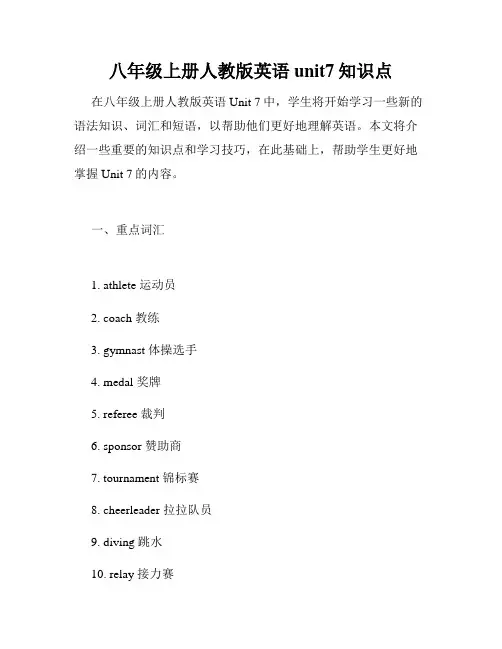
八年级上册人教版英语unit7知识点在八年级上册人教版英语Unit 7中,学生将开始学习一些新的语法知识、词汇和短语,以帮助他们更好地理解英语。
本文将介绍一些重要的知识点和学习技巧,在此基础上,帮助学生更好地掌握Unit 7的内容。
一、重点词汇1. athlete 运动员2. coach 教练3. gymnast 体操选手4. medal 奖牌5. referee 裁判6. sponsor 赞助商7. tournament 锦标赛8. cheerleader 拉拉队员9. diving 跳水10. relay 接力赛二、语法知识1. 一般现在时:用于描述现在的事情和状态。
例句:I usually get up at six o'clock in the morning.2. 现在进行时:用于描述正在发生的动作。
例句:He is playing basketball with his friends now.3. 形容词比较级和最高级:用于比较两个或多个事物的程度。
例句:Lucy is taller than Lily, but Lily is the smartest in their class.4. 一般过去时:用于描述过去的事情。
例句:I watched a movie last night.三、学习技巧1. 听力:在听力练习中,学生应该注重听懂内容的基础上,提高对语音和语调的敏感度。
2. 语法:学生应该注重掌握英语基础语法,例如名词、动词、形容词等,以便正确表达自己的意思。
3. 阅读:学生应该多读英语文章,尤其是关于运动员和体育赛事的文章。
通过阅读可以了解相关的词汇和表达方式。
4. 口语:通过模仿、反复练习,学生可以提高口语表达能力。
可以利用录音设备进行自我评估。
在学习八年级上册人教版英语Unit 7时,学生需要注重对语法知识的掌握,同时注意抓住重点词汇和短语,通过多种学习技巧提高自己的语言能力。
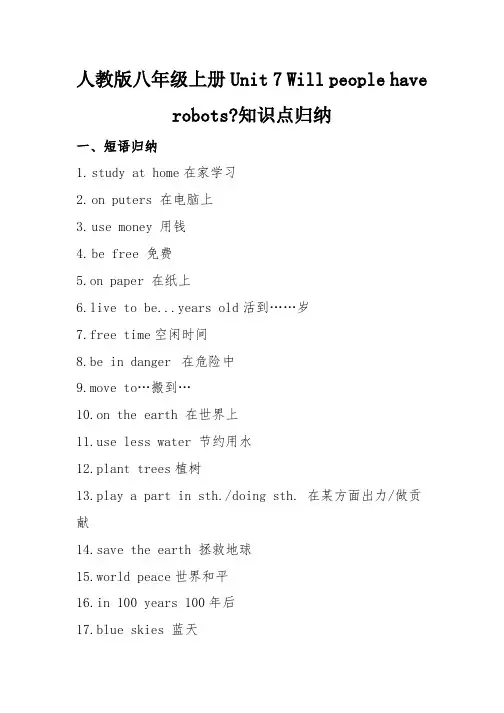
人教版八年级上册Unit 7 Will people haverobots?知识点归纳一、短语归纳1.study at home在家学习2.on puters 在电脑上e money 用钱4.be free 免费5.on paper 在纸上6.live to be...years old活到……岁7.free time空闲时间8.be in danger在危险中9.move to…搬到…10.on the earth 在世界上e less water 节约用水12.plant trees植树13.play a part in sth./doing sth. 在某方面出力/做贡献14.save the earth 拯救地球15.world peace世界和平16.in 100 years 100年后17.blue skies 蓝天18.in the future 未来19.space station太空站20.fly rockets to…乘火箭去…21.live on a space station 在太空飞船上生活22.do simple jobs 做简单的工作23. over and over again 反复24.get bored无聊25.look like看起来像26.make sb do sth 使某人做某事27.be able to do sth 能够做某事28. wake up 醒来/唤醒29.disagree with sb.不同意30.hundreds of 成百上千的31.fall down倒下/落下32.look for 寻找33.at some point 在某一方面34.which side 哪一方面35.agree with 同意36.fresh water淡水37.fly up into the sky 飞向天空38.be scared of sth 害怕某物39.be scared to do sth 害怕做某事二、重点句子1.Will people have robots?2.Do you think there will be robots in people’s homes?3.People will live to be 200 years old.4.There will be more people.5.There will be less free time.6.What’s your prediction about the future?7. I don’t think so.8.What will the future be like?9.Everyone should play a part in saving the earth.10.I sometimes see blue skies in my city.11.Scientists are now trying to make robots look likes humans and do the same things as we do.12.If bulidings fall down with people inside, these snake robots can help look for people under the buildings.13.Which side do you agree with?三、知识点归纳1.will +do 表示将来,同时也表示说话人主观愿意做的事,当主语是第一人称I/we时,也可以用shall.2.there be 将来时 there will bethere be going to be (第一个be就近原则)3.free 形容词有空的,available免费的4.more/less/fewer 区别more是many和much 的比较级,更多less 是little比较级,更少,修饰不可数fewer 是few的比较级,较少的,修饰可数名词5.crowd 名词拥挤形容词 crowded 拥挤的形容词反义词 uncrowded 不挤的6.a book about future 关于未来的书,about 关于=on7.danger 名词危险 be in great danger形容词 dangerous8.have to do不得不9.play a part in =play a role in doing sth 在某方面起作用10.spend 花费主语通常是人,spend 时间 in doing sth spend 时间 on sth过去式 spentpay 主语是人,pay forcost 主语是物take 主语是it it takes sb 时间 to do sth11.fly a rocket to the moon =fly rockets to thr moon12.there be sb doing sth 有人正在做某事13.bored 人感觉无聊,修饰人boring 东西无聊,修饰物14.make sb do sth 使某人做某事15.hundreds of 成百上千的,hundred 百,基数词修饰时,无论是几,都是单数。
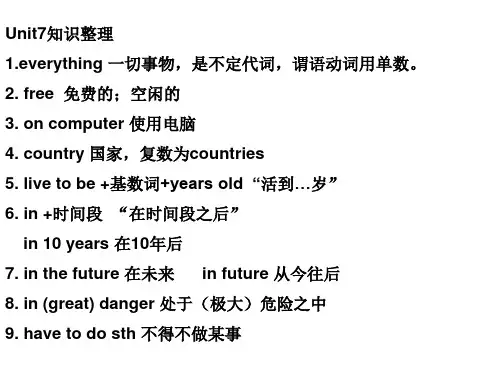
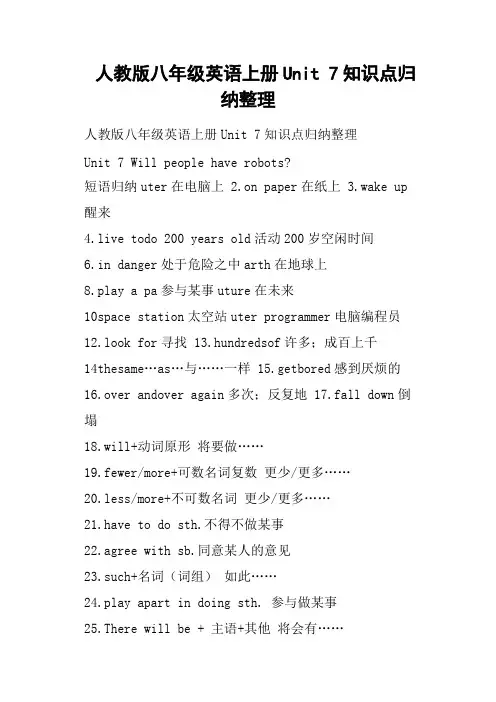
人教版八年级英语上册Unit 7知识点归纳整理人教版八年级英语上册Unit 7知识点归纳整理Unit 7 Will people have robots?短语归纳uter在电脑上 2.on paper在纸上 3.wake up 醒来4.live todo 200 years old活动200岁空闲时间6.in danger处于危险之中arth在地球上8.play a pa参与某事uture在未来10space station太空站uter programmer电脑编程员12.look for寻找 13.hundredsof许多;成百上千14thesame…as…与……一样 15.getbored感到厌烦的16.over andover again多次;反复地 17.fall down倒塌18.will+动词原形将要做……19.fewer/more+可数名词复数更少/更多……20.less/more+不可数名词更少/更多……21.have to do sth.不得不做某事22.agree with sb.同意某人的意见23.such+名词(词组)如此……24.play apart in doing sth. 参与做某事25.There will be + 主语+其他将会有……26.There is/are +sb./sth.+doing sth.有……正在做某事27.make sb. dlp sb. withsth.帮助某人做某事2do sth. 尽力做某事29.It’s+ adj.+for sb. to do sth. 对某人来说,做某事……的。
语法讲解1. Books will only buaper. 书将只在电脑里,而不是在纸上。
2. There will bllution. 将会有更多的污染。
1).There will be+ n = There is/aregoing to be + n 将会有… (不能have与连用) Thereis going to be a football maFriday.2). pollution(u.n): 污染;公害 pollute(v):污染;弄脏 polluted(adj):受污染的3. Evuld play a part in saving theearth. 每个人应该参与挽救地球。

八年级上册Unit 7 (词汇+语法讲解)(学习版)编制人:__________________审核人:__________________审批人:__________________编制学校:__________________编制时间:____年____月____日序言下载提示:该文档是本店铺精心编制而成的,希望大家下载后,能够帮助大家解决实际问题。
文档下载后可定制修改,请根据实际需要进行调整和使用,谢谢!并且,本店铺为大家提供各种类型的经典范文,如英语单词、英语语法、英语听力、英语知识点、语文知识点、文言文、数学公式、数学知识点、作文大全、其他资料等等,想了解不同范文格式和写法,敬请关注!Download tips: This document is carefully compiled by this editor.I hope that after you download it, it can help you solve practical problems. The document can be customized and modified after downloading, please adjust and use it according to actual needs, thank you!In addition, this shop provides various types of classic sample essays, such as English words, English grammar, English listening, English knowledge points, Chinese knowledge points, classical Chinese, mathematical formulas, mathematics knowledge points, composition books, other materials, etc. Learn about the different formats and writing styles of sample essays, so stay tuned!八年级上册Unit 7 (词汇+语法讲解)【单词变性】dangerous形容词变名词_________________possible形容词变副词_________________probably副词变形容词_________________peace名词变形容词_________________pollute动词变名词_________________prediction名词变动词_________________believe动词变名词_________________disagree动词变名词_________________【一词多义】1. even _____________ _____________ ____________Mary works even harder than before.Even if you fail, work hard and you will still succeed one day.Mother worries me a lot, she said, “the things around you are too dangerous, even a small piece of paper can hurt you.”2. earth ___________ ____________We have only one earth. We should protect it well.What on earth is that?3. paper ____________ ____________You can write what you want to say on a piece of paper.Time’s up. Hand in your papers please.4. fall ___________ _____________“Fall” has the same meaning as “autumn”.Kids can fall down from bikes easily when first learning how to ride it.5. plant ___________ _____________We will plant many trees on Trees Planting Day.Plants need watering often.6. space _____________ ______________I‘d like to fly to space one day.There is some space for us to put the piano.【词汇用法】1. already: adv./用于现在完成时/用于肯定句中相关词辨析: already vs. yetalready: adv./用于现在完成时/用于肯定句中yet: adv./用于现在完成时/用于否定句2. during: prep./during +时间段/during the past few years(现在完成时)相关词辨析: during vs. for vs. induring: prep./during the past few years(现在完成时)for: prep./for +一段时间(用延续性动词,通常用一般过去时,现在完成时)in: prep./in +一段时间(固定搭配或一般将来时)3. believe: v./belive sb./believe in sb./believe it or not 相关词辨析: trust vs. believetrust: v./trust sb.believe: v./believe sb./believe in sb.【高频短语】in future___________in the future___________on holiday___________take part in___________out of shape___________in shape___________on either side of the road___________in space___________little space___________have a word with sb. ___________have words with sb. ___________in a word___________in other words___________believe in___________believe it or not___________fall off___________fall over___________fall down___________fall in love with___________fall asleep___________【攻占语法】情态动词(will)一、will的问答:1) —Will you come to my party?—Yes, I will., I won’t.二、will 的用法:1. 用于一般将来时2. 表示现在的习惯, 当表示过去的习惯时用wouldHe will often read English books all night.He would always have bread for breakfast in his childhood.3. 表示强烈的意愿: 常用于口语中重读。
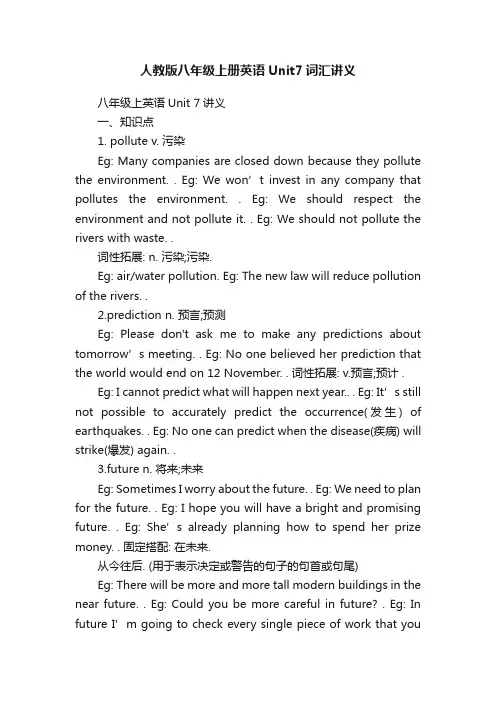
人教版八年级上册英语Unit7词汇讲义八年级上英语Unit 7讲义一、知识点1. pollute v. 污染Eg: Many companies are closed down because they pollute the environment. . Eg: We won’t invest in any company that pollutes the environment. . Eg: We should respect the environment and not pollute it. . Eg: We should not pollute the rivers with waste. .词性拓展: n. 污染;污染.Eg: air/water pollution. Eg: The new law will reduce pollution of the rivers. .2.prediction n. 预言;预测Eg: Please don't ask me to make any predictions about tomorrow’s meeting. . Eg: No one believed her prediction that the world would end on 12 November. . 词性拓展: v.预言;预计 .Eg: I cannot predict what will happen next year.. . Eg: It’s still not possible to accurately predict the occurrence(发生) of earthquakes. . Eg: No one can predict when the disease(疾病) will strike(爆发) again. .3.future n. 将来;未来Eg: Sometimes I worry about the future. . Eg: We need to plan for the future. . Eg: I hope you will have a bright and promising future. . Eg: She’s already planning how to spend her prize money. . 固定搭配: 在未来.从今往后. (用于表示决定或警告的句子的句首或句尾)Eg: There will be more and more tall modern buildings in the near future. . Eg: Could you be more careful in future? . Eg: In future I’m going to ch eck every single piece of work that youdo! .4.environment n. 环境Eg: We’re not doing enough to protect the environment from pollution. . Eg: It would be better for the environment if more people used bikes rather than cars. . Eg:The office is quite bright and airy-it’s a pleasant working environment. . Eg: As a parent you should try to create a comfortable home environment. . 词性拓展: adj. 有关环境的. adv. 与环境有关地. Eg: Environmental pollution/protection has been a global concern. . Eg: Riding shared bikes is an environmentally-friendly way to travel. .5.believe v. 相信;认为有可能Eg: You can’t believe anything he says. . Eg: Strangely, no one believed us when we told them we saw the UFO. . Eg: The teacher believes that all her students can pass the exam. . Eg: “Is she com ing alone?” “We believe not/so.”(=we think she is not/is) . 固定搭配: 信不信由你.Eg: He’s upstairs doing his homework, believe it or not. . Eg: It’s hard to believe there’s anything wrong with him-he looks so healthy. .6.plant v. 种植n. 植物Eg: We planted tress and bushes in our new garden. . Eg: I think I’ll try planting some vegetables this year. . Eg: Before deciding what to plant, think about how much sun comes into that area. . Eg: Water the plants twice a week, preferably in the morning. . Eg: This plant grows quickly and provides excellent fruits. .7. agree v. 同意;赞成;应允Eg: Ann and I never seem to agree. . Eg: I agree with you on this issue. . Eg: I agree that he should be invited. . Eg: Expertsseem unable to agree whether the drug is safe or not. . 词性拓展: n. 赞同;一致. 反义词: v. 不同意;有分歧.Eg: The whole family was in agreement with her about/on what they should do. . Eg: If the three parties cannot reach agreement now, there will be a civil war. . Eg: I’m afraid I have to disagree with you on that issue. . Eg: I strongly disagree with (do not accept) the decision that has been made. .8. shape n. 形状;外形Eg: Kim's birthday cake was in the shape of a train. . Eg: This T-shirt has been washed so many times that it’s lost its shape(=out of shape). . Eg: I could see a dark shape in the street outside. . Eg: A good teacher helps shape a child’s character. .9.build(built) v. 建筑;建筑Eg: They're building new houses by the river. . Eg: We want to build a better future for our children. . 词性拓展: n. 建筑物. 短语拓展: 建立;加强增强.Eg: Thousands of buildings collapsed in the earthquake. . Eg: More and more modern office buildings are built in the cities. . Eg: The police entered the building by the side door. . Eg: We should exercise regularly to build up our health. .10. fall(fell) v. 倒塌;跌落;掉落n. 秋天Eg: He fell badly and broke his leg. . Eg: The little boy fell into the river and lost his life. . Eg: The temperature could fall below zero overnight. . Eg: It was October and the leaves had started to fall. .词性拓展: adj. 倒下的.Eg: A fallen tree was blocking the road. .短语拓展: 突然倒下;跌倒. 进入梦乡;睡着.爱上;坠入爱河. 生病.被...绊倒. 落后.Eg: Many buildings in the old part of the city are falling down. .Eg: I fell asleep as soon as my head hit the pillow. . Eg: He fell in love with a young German student. . Eg: It is easy for the old to fall ill in winter. . Eg: I was frightened that Granny would fall over on the ice. . Eg: He was ill for six weeks and fell behind with his schoolwork. .11.space n. 太空;空间Eg: Is there any space for my clothes in the cupboard? . Eg: I need to m ake some space for Mark’s things. . Eg: The blank space at the end of the form is for your name. .12.peace n. 和平Eg: Peace lasted in Europe for just over twenty years . . Eg: She’s very good at keeping peace within the family. . Eg: He says he’s at peace when he’s walking in the mountains. .词性拓展: adj. 和平的;宁静的.Eg: I just want to lead a peaceful life. . Eg: peaceful evening .13.dangerous adj. 有危险的;不安全的Eg: She walked home by herself, although she knew that it was dangerous. . Eg: His parents won't let him swim in the river because they think it’s too dangerous. . Eg: It’s dangerous to play fire. . 词性拓展: n. 危险. 短语拓展:处于危险中.Eg: He drove so fast that I really felt my life was in danger. . Eg: The doctor say he is now out of danger.(is not expected to die) . Eg: Icy roads are a danger to drivers. .14.possible adj. 可能的Eg: Is it possible to buy tickets in advance. . Eg: Please take your seat as quickly/soon as possible. .Eg:With today’s technology almost anything seems possible. . 词性拓展: adv. 可能地. 反义词:不可能的.Eg: I think he may possibly decide not to come. . Eg: There were possibly a hundred people at the meeting. . Eg: It was impossible to sleep because of the noise. . Eg: It seems impossible that I could have walked by without noticing her. .15.word n. 单词;话语Eg: Do not write more than 200 words. . Eg: Tell me what happened in your own words. .Eg: Could I have a private/quick word with you? .Eg: I don’t believe a word of his story. .短语拓展: 遵守诺言.Eg: Once you make a promise, you should always keep your word. . Eg: I give you my word that it won’t happen again. .。
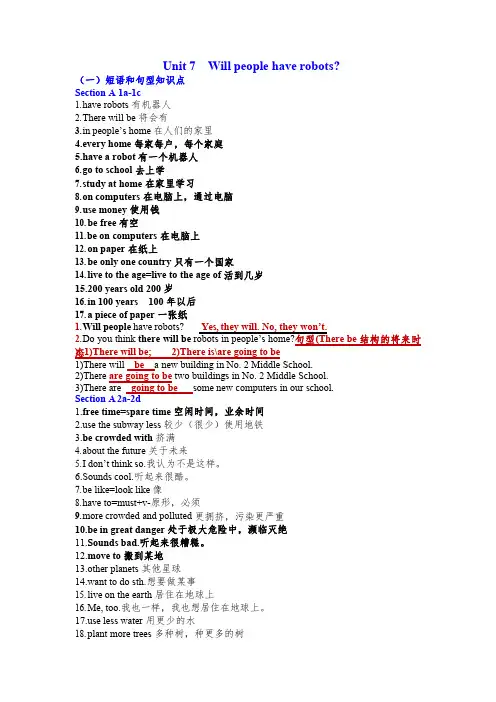
Unit7Will people have robots?(一)短语和句型知识点Section A1a-1c1.have robots有机器人2.There will be将会有3.in people’s home在人们的家里4.every home每家每户,每个家庭5.have a robot有一个机器人6.go to school去上学7.study at home在家里学习8.on computers在电脑上,通过电脑e money使用钱10.be free有空11.be on computers在电脑上12.on paper在纸上13.be only one country只有一个国家14.live to the age=live to the age of活到几岁15.200years old200岁16.in100years100年以后17.a piece of paper一张纸1.Will people have robots?Yes,they will.No,they won’t.2.Do you think there will be robots in people’s home?句型(There be结构的将来时态):1)There will be;2)There is\are going to be1)There will be a new building in No.2Middle School.2)There are going to be two buildings in No.2Middle School.3)There are going to be some new computers in our school.Section A2a-2d1.free time=spare time空闲时间,业余时间e the subway less较少(很少)使用地铁3.be crowded with挤满4.about the future关于未来5.I don’t think so.我认为不是这样。
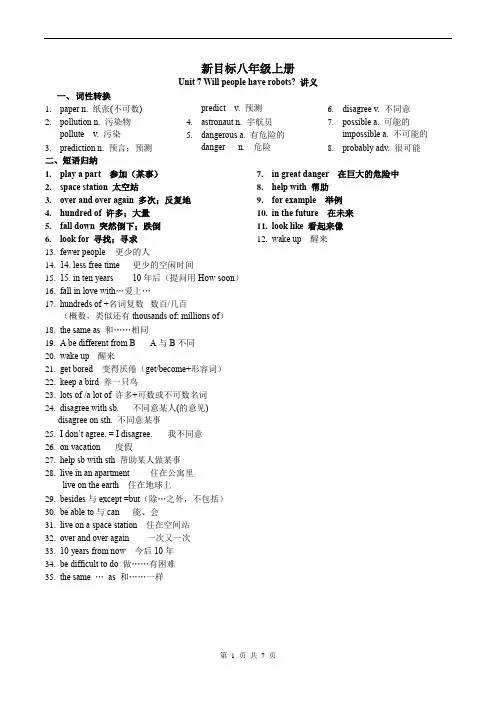
新目标八年级上册Unit 7 Will people have robots? 讲义一、词性转换1.paper n. 纸张(不可数)2.pollution n. 污染物pollute v. 污染3.prediction n. 预言;预测predict v. 预测4.astronaut n. 宇航员5.dangerous a. 有危险的danger n. 危险6.disagree v. 不同意7.possible a. 可能的impossible a. 不可能的8.probably adv. 很可能二、短语归纳1.play a part 参加(某事)2.space station 太空站3.over and over again 多次;反复地4.hundred of 许多;大量5.fall down 突然倒下;跌倒6.look for 寻找;寻求7.in great danger 在巨大的危险中8.help with 帮助9.for example 举例10.in the future 在未来11.look like 看起来像12.wake up 醒来13.fewer people更少的人14.14. less free time更少的空闲时间15.15. in ten years 10年后(提问用How soon)16.fall in love with…爱上…17.hundreds of +名词复数数百/几百(概数,类似还有thousands of; millions of)18.the same as 和……相同19.A be different from B A与B不同20.wake up醒来21.get bored变得厌倦(get/become+形容词)22.keep a bird 养一只鸟23.lots of /a lot of许多+可数或不可数名词24.disagree with sb.不同意某人(的意见)disagree on sth. 不同意某事25.I don’t agree. = I disagree.我不同意26.on vacation度假27.help sb with sth 帮助某人做某事28.live in an apartment住在公寓里live on the earth 住在地球上29.besides与except =but(除…之外,不包括)30.be able to与can 能、会31.live on a space station 住在空间站32.over and over again 一次又一次33.10 years from now 今后10年34.be difficult to do 做……有困难35.the same …as 和……一样三、重难点深度解析1. Do you think there will be robots in people's homes? 你认为将来人们的家里会有机器人吗?Do you think...? 结构通常用来征求对方的意见或看法,后面接宾语从句,从句用陈述语序。
人教版八年级英语上册第七单元知识详解考点扫描:人教版八年级英语上册第七单元知识详解一)习惯用语:take off 脱下 put on 穿上cut up 切碎turn on 打开 turn off 关掉turn down/ up把声音调小/大mix up混合在一起put…away 把…收起来put off 推迟,延期take away拿走a slice of bread 一片面包two teaspoons of honey 两汤匙蜂蜜two cups of yogurt 两杯酸奶a kilo of tomatoes 一公斤西红柿a piece of information/ paper/ news/ musicadd…to…把…加到…上pour…into… 倒…到…里put…in(into)…放…在(到)…里on the top 在顶部finally=at last 最后2 teaspoons of relish两茶匙调味品put…on...把……放到……上二)重点句型:1.Turn on the blender.打开果汁搅拌机。
2.Cut up the bananas.切开香蕉。
3.Pour the milk into the blender.将牛奶倒入果汁机里。
4.Put some relish on a slice of bread.将调味品涂到一片面包上。
5.Put the bananas and yogurt into the blender.将香蕉和酸奶倒人果汁机。
6.How do you make a banana milk shake?你如何做香蕉奶昔?7.First, put 1 teaspoon of mayonnaise on the sandwich.首先,在三明治上放一茶匙蛋黄酱。
三)交际用语:How do you make a banana milk shake?First,peel the bananas and cut them up.Then put the milk into the blender…How many bananas do we need? We need three bananas.四)主题写作:给你一些配料和步骤,要你写一篇...的制作说明.词语点击:1. cut:[k?t]1)及物动词 vt. 切;割;剪;削;砍;削减;缩短Please cut the cake into ten pieces. 请把蛋糕切成十块。
Uni t 7 Will people have robots?❖重要知识点1.Make predictions about the future: 对未来作出预测--- What will the future be like ? 未来将会是什么样的?= What’s your prediction about the future? 你对未来的预测是什么?➢People will have robots in their homes. 人们将在自己家中拥有机器人。
➢Books will only be on computers, not on paper. 书将只会在电脑上,不在纸上。
➢People will live to be 200 years old. 人们将会活到200岁。
➢People won’t use money . Everything will be free.人们将不再使用钱,一切都是免费的。
➢Kids won’t go to school. They’ll study at home on computers.孩子们将不再去学校,他们将在家用电脑学习。
➢Cities will be more crowded and polluted because there will be more people.城市将会变得更加拥挤,污染更严重,因为将会有更多的人。
➢The environment will be in great danger. There will be fewer trees. There will be more pollution.环境将处于极大危险当中,将会有更少的书,将会有更多的污染。
➢There will be fewer jobs for people because more robots will do the same things as people .将会有更少的工作给人,因为更多的机器人将会和人做相同的事情。
人教版八年级英语上册Unit7知识点归纳整理Unit 7 Knowledge Points Summary (人教版八年级英语上册)Unit 7 of the People's Education Edition Grade 8 English textbook focuses on various knowledge points related to the theme "What's the highest mountain in the world?" In this unit, we will explore topics such as geographical features, comparison of adjectives, superlatives, definite and indefinite articles, and more. Let's go through these key points in a detailed manner.1. Geographical Features:- Mountains: We learn about the world's highest mountains, such as Mount Everest, K2, and Kangchenjunga. We understand how mountains are formed and their significance in shaping the Earth's landscape.- Rivers: We discuss major rivers, including the Nile, the Amazon, and the Yangtze. We examine their locations, lengths, and importance for human civilizations.2. Comparison of Adjectives:- Regular Adjectives: We review the formation of comparative and superlative forms of regular adjectives. For example:- Comparative: tall ➜ taller, interesting ➜ more interesting- Superlative: tall ➜ tallest, interesting ➜ most interesting- Irregular Adjectives: We study the comparison of irregular adjectives, such as good, bad, little, many, etc. For example:- Comparative: good ➜ better, bad ➜ worse, little ➜ less, many ➜more- Superlative: good ➜ best, bad ➜ worst, little ➜ least, many ➜ most3. Superlatives:- Superlative Adjectives: We learn to use superlative adjectives to compare three or more things. For example:- Everest is the highest mountain.- The Amazon is the longest river.- Superlative Adverbs: We also explore the use of superlative adverbs. For example:- The goods were manufactured most efficiently in that factory.- She spoke most fluently among all the participants.4. Definite and Indefinite Articles:- Definite Article "the": We understand when and how to use "the" before nouns. For example, we use "the" when referring to specific objects, unique items, or things previously mentioned.- The Eiffel Tower is a famous landmark.- I lost the key that you gave me yesterday.- Indefinite Article "a/an": We learn when to use "a" or "an" before countable singular nouns. For example, "a" is used before consonant sounds, while "an" is used before vowel sounds.- She bought a book about space travel.- He is an honest person.5. Expressing Opinions:- We practice expressing personal opinions using adjectives, adverbs, and comparative/superlative forms. For example:- I think Mount Everest is the most fascinating mountain.- In my opinion, the Amazon River is the most important river in the world.6. Using Comparatives in Context:- We apply comparative forms in various contexts, such as discussing prices, distances, and abilities. For example:- This laptop is cheaper than that one.- London is further north than Rome.- She runs faster than her sister.These knowledge points provide a comprehensive understanding of Unit 7 in the People's Education Edition Grade 8 English textbook. By mastering these concepts, students will be equipped with the necessary language skills to describe geographical features, compare objects, and express opinions confidently. With further practice and application, they will enhance theiroverall English competence, enabling them to communicate effectively in various situations.。
人教版初二英语八年级上册Unit7知识点Unit7 Will people have robots?【重点词语/短语用法解析】1.many+可数名词许多......much+不可数名词许多......2.live to be+基数词+ years old“活到...…岁”3. bein great danger 处在极大的危险中4.play a part in +名/代/V-ing. 参与某事/做某事Everyone should play a part in saving theearth.5.help (sb.) with sth. 帮助(某人)做某事He often helps me with my English.help sb. (to) do sth. 帮助(某人)做……He often helps me study English.help oneself ( to ) 自用(食物等)Help yourself to the fish. 请随便吃鱼6.the same as… 和……一样...... 反义短语:be different from7. It takes/took/will take sb. some time to do sth. 某人花了……时间做某事(时态根据具体情况决定)It takes me an hour to get to my office.spend time/moneyon sth. 在……上花费时间(金钱)sb. spend time/money (in) doing sth. 花费时间(金钱)做某事。
I spent two hours on this math problem. 这道数学题花了我个小时。
They spent two years building this bridge. 造这座桥花了他们两年时间。
8.hundreds of + 名词复数许多/大量......数词+hundred + 名词复数几百......类似的数词还有thousand(千), million(万)There are four hundred students in ourgrade.There are hundreds of tourists in Beijingevery year.9.during 在…期间during the vacation/the daytime/the weekend10.the meaning of …的意思Can you tell me the meaning of the words?【重点语法】一般将来时一、一般将来时的含义一般将来时表示将来某个时间要发生的动作或状态,或将来经常发生的动作或状态。
八年级上册英语人教版unit7知识点本篇文章将为大家介绍八年级上册英语人教版unit7的知识点,希望对大家学习英语有所帮助。
一、语法知识点1. 直接引语和间接引语直接引语是直接引用别人说过的话,用引号括起来,例如:He said, “I am going to the cinema”.间接引语是转述别人说过的话,没有引号,例如:He said he was going to the cinema.2. 定语从句定语从句是在句子中作定语的从句,它通常用来修饰名词或代词。
定语从句的引导词有which,who,whom,that等。
例如:The boy who is wearing a red cap is my cousin.3. 状语从句状语从句是在句子中作状语的从句,它通常用来表示时间,原因,条件,结果等。
状语从句的引导词有when,if,because,since,although等。
例如:If it rains tomorrow, we will stay at home.4. 名词性从句名词性从句是在句子中作名词的从句,它可以作主语,宾语,表语或补语。
名词性从句的引导词有that,whether,if,who,what等。
例如:What he said is true.二、词汇知识点1. 动词词组动词词组由动词加上介词或副词构成,例如:look after,put on,take off等。
2. 形容词词组形容词词组由形容词加上介词或副词构成,例如:happy with,interested in,famous for等。
3. 常用短语常用短语是日常生活中经常遇到的词组,例如:in order to,as soon as possible,be afraid of等。
三、听力技巧1. 注意听取关键词在听力时,应该注意听取关键词,例如时间,地点,人物等。
2. 不要死记硬背在听力时,不要死记硬背,应该听懂意思,理解句子。
人教版新课标八年级上册英语Unit 7知识点归纳人教版新课标八年级上册英语Unit7知识点归纳Unit7Howdoyoumakeabananamilkshake?【复习目标】●学会询问和描述一种食物的制作过程●学习询问和描述做一件事情的过程●能够依据指示语做事情●区分可数名词和不可数名词【语言目标】●Howdoyoumakeabananamilksmoothie?First,peelthebananasandcutitup.thenputthemilkintoth eblender....●Howmanybananasdoweneed?weneedthreebananas.【语言结构】●祈使句/可数名词和不可数名词●Howmuch/Howmany引导的特殊疑问句【重点词汇】●turnon,cutup,peel,pour,put,mixup,/howmuch,howmany,a mount●milksmoothie,yogurtwatermelon,ingredient,sauce,popc orn●blender,teaspoon,cup,/first,then,next●sandwich,lettuce,relish,turkey,bread【应掌握的词组】.makeabananasmoothie制作香蕉混合饮料2.peelthebananas剥香蕉3.cutupthebananas切碎香蕉4.pourthemilkintheblender将牛奶倒入搅拌器5.turnontheblender打开搅拌器电源6.puttheyogurtintheblender将酸奶放入搅拌器7.turnoff关上,turnup旋大(灯火等),开大(煤气等)调高(声音等),turndown把(灯火、电器等)关小一点8.howmuchcinnamon多少肉桂9.oneteaspoonofcinnamon一茶匙肉桂0.makefruitsalad制作水果沙拉1.twopiecesofbread两片面包2.mixitallup将它们混合在一起4.turkeyslices火鸡肉片,asliceofbread一片面包3.takesturnsdoingsth,taketurnstodosth.=dosth.inturns轮流做某事5.slicesofduck烤鸭片6.rollpancake卷上薄饼7.makefaces作鬼脸makefriendswith与……交朋友makeanoise吵闹,makemistakes犯错误,makethebed整理床铺makeone’swayto往…走去,makeroomfor给…腾出地方8.it’seasytodosth.做某事容易it’shardtodosth.做某事难,It’snecessarytodosth.做某事必要9.putsth,inorder将某些东西按顺序排列20.arecipefor……的烹调方法,……的菜【应掌握的句子】.Howdoyoumakeabananasmoothie?如何制作香蕉思木西?翻译:如何制作水果沙拉?他们是怎样制作爆米花的?工人们正在制造机器。
八年级上册英语Unit 7知识点与语法精讲精练词汇梳理(一)完成单词梳理:名词:1. 纸;纸张 2. 污染;污染物 3. 语言;预测4. 将来;未来5. 环境6. 行星7. 地球;世界8. 部分9. 和平10. 海;海洋11. 天空12. 宇航员;航天员13. 公寓套房14. 火箭15. 太空;空间16. 仆人17. 单词;词18. 工厂19. 形状;外形20. 一方(的意见、态度、立场)21. 假期;假日动词:1. 污染 2. 建筑;建造 3. 相信;认为有可能4. 不同意;持不同意见;有分歧5. 同意;赞成;应允副词:1. 已经;早已 2. 甚至;连;愈加 3. 很可能;大概介词:1. 在……期间形容词:1. 有危险的;不安全的 2. 可能存在或发生的;可能的3. 不可能存在或发生的;不可能的兼类词:1. (v)种植(n)植物 2. (adj)人的(n)人3. (v/n)倒塌;跌倒(n)(美式)秋天4. (adj/prep)在……里面(二) 词汇变形小结:1. pollute (v. 污染) — (n. 污染)2. peace (n. 和平) — (adj. 和平的)3. build (v. 建筑) — (n. 建筑物)4. dangerous (adj. 危险的) — (n. 危险)5. Japan (n. 日本) — (adj/n. 日本的;日本人)6. agree (v. 同意) — (反义词:不同意)7. fall(v. 倒塌;跌倒;掉落— (过去式)8. possible(adj. 可能的) — (反义词:不可能的)9. probable(adj. 可能的) — (adv. 很可能)10.prediction(n. 预测) — (v. 预测)【练一练】用所给词的适当形式填空1.I'm sorry that I____________(agree) with you,because your idea is too old.2.We should take action to protect animals in ____________(dangerous).3.It seems ____________ (possible) that people can fly.4.The ____________ ( pollute) in the city is being more and more serious.5.There are many ____________ (planet), such as Venus, the Earth and Mars.6.There will be more tall____________(build) in the city next year.7.This is my ____________ (predict) about my future.8.Could you please give me some____________(paper)? I want to write an article.9.Now there are already robots working in these ____________ (factory).10.He does the same thing everyday.It____________(sound) boring.(三) 短语攻关:参与;发挥作用太空站;宇宙空间站多次;反复地许多;大量突然倒下;跌倒寻找;寻求在电脑上;通过电脑在地球上在将来和……一样度假活到200岁一百年后处于极大的危险中淡水醒来;叫醒知识点梳理1.Books will only be on puters, not on paper. 书将只会在电脑上出现,而不会以纸质形式出现。
【用法详解】 重点:paper在此处作不可数名词。
“一张纸”要用a piece/sheet of paper表示,多于一张纸要用“基数词+piece/sheets of paper”表示。
Eg.He wrote his phone number on a piece of paper. 他把他的号码写在了一张纸上。
【拓展延伸】paper还可作可数名词,意为“报纸;论文;试卷”。
Eg.I read about it in the paper. 我从报纸上得知这件事。
Mr.Wang spent the whole night marking exam papers. 王老师花费一整晚批阅试卷。
【即学即用】1.—Can I help you, sir?—I’d like to have 100 . I want my students to draw pictures.A.piece of paperB.pieces of paperC.pieces of papersD.piece of paper2.Jenny is good at making flowers with (paper).2.Will people use money in 100 years? 100年后人们还会使用钱吗?【用法详解】“in+时间段”表示“在……以后”,Eg.—How soon will he e back? 他多久回来?—In twenty minutes. 20分钟后。
【易混辨析】in与afterEg.He will e here in two hours. 他两个小时后会来这儿。
After about three months, he gave up smoking. 大约三个月后,他戒烟了。
He will arrive after four o’clock. 他四点后会到。
【即学即用】1.—How soon will we get the offer from a new high school?—about two months.2.—can I get the book if I order it today?—In a week.A.How soonB.How longC.How muchD. How many3.There will be (more/less/fewer) pollution. 将会有(更多的/更少的/更少的)污染。
【用法详解】Eg.There will be more trees. 将会有更多的树。
People will have less free time. 人们将会有更少的空闲时间。
There will be fewer jobs. 将会有更少的工作。
【即学即用】1.If we want to be thinner and healthier, we should eat ________ food and take ________ exercise.A.less; moreB.more; lessC.more; fewerD.fewer; more2.—In 2050, what will the world's population be?—I think cities will be really big and crowded because there will be a lot ________ people.A.muchB.moreC.many3.I am busy now. I have ___________(little) free time than before.4.Everyone should play a part in saving the earth. 每个人都应当尽一份力来拯救地球。
【用法详解】(1)play a part 意为“参与;发挥作用”,常与介词in 连用,play a part in 后接名词、代词或动词ing 形式。
part 在此处作名词,意为“参加;参与”(part 前可以用important, good, great 等形容词修饰)。
Eg.Everyone can play an important part in society. 每个人都可以在社会中起重要作用。
【翻译句子】我们都应该为保持我们学校干净尽一份力。
(play a part in ) .(2)earth 为名词,意为“地球;世界”,是世界上独一无二的事物,因此其前一般要加定冠词。
5.Today there are already robots working in factories. 如今,已经有机器人在工厂里工作了。
【易混辨析】(1)already 与yet(2)There be sb./sth. doing sth 有某人/某物正在做某事Eg.There is a girl singing in the next room.隔壁房间里有一个女孩正在唱歌。
There are two cats sleeping in the sun. 有两只猫正在阳光下睡觉。
【即学即用】1.I have finished my homework. I finished it an hour ago.A.yetB.alreadyC.everD.never2.It is fine today. There are many old people _________ on the square(广场).A.to dance C.are dancing6. ①But many scientists disagree with Mr.White. 但是很多科学家不同意怀特先生(的观点)。
②However, they agree it may take hundreds of years. 然而,他们一致认为这或许会需要许多年的时间。
【用法详解】disagree 与agree 互为反义词,其用法相同。
下面以agree 为例讲解它们的用法。
Eg.As for me,I agree with latter. 就我the而言,我同意后者。
We agree toleave at once. 我们同意马上离开。
【拓展延伸】dis 为常见的否定前缀,表示“不;非;相反”。
常见的含有dis 的词还有:like (v.喜欢)→dislike (v.不喜欢) appear (v.出现)→disappear (v.消失)【即学即用】They ________ (agree) with each other because they have different ideas.【易混辨析】 重点:hundred 与hundreds of【拓展延伸】与hundred 用法相同的还有thousand (千),million (百万),billion (十亿)。